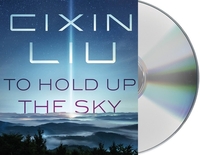Take a photo of a barcode or cover
Although some of the short stories were very interesting and a joy to read, others were so boring that I forgot what was going on halfway through and would have to restart. Seriously.
adventurous
challenging
hopeful
inspiring
reflective
tense
adventurous
reflective
medium-paced
Magnificent! Some of the best short science fiction stories I've ever read. I'm going to be mulling these over for a long time. I need to get a hard copy!
It's a collection of short stories. I loved the first ones, but got bored with the last ones. The were either too abstract or had a ver wage connection with the main topic, in m opinion
adventurous
challenging
hopeful
reflective
medium-paced
Plot or Character Driven:
Plot
Strong character development:
Complicated
Loveable characters:
Complicated
Diverse cast of characters:
Complicated
Flaws of characters a main focus:
Complicated
It's flawed, yet carries an enticing promise of brilliance. Of course, as is always the case with collections of short stories, some stories are better and some are worse. It can be unjust to judge such a collection as a whole. However, in this one, the pattern sketched in the foreword is very well visible in all of the stories: in one way or another, the stories all describe encounters of the great with the small; the small often encompassing all of humanity.
The good: the best stories have the absurdist dreamlike quality of Italo Calvino's works, shining bright lights at simple ideas to show them from an entirely different angle, and they are a delight to read. From Earth-sized mirrors that play music on a planetary scale through low-temperature artists capable of draining oceans to talking dinosaurs unable to appreciate poetry, they are works of imagination par excellence. For posterity, this was, in the order they appear in the book: 1, 2, 7, 9, 10, 11. The best ones are perhaps the very last ones, Cloud of Poems and The Thinker, but these are all worth reading, and perhaps re-reading as well.
The bad: the more "realistic" stories suffer under the weight of flat characters and unlikely developments, feeling a bit crude or naive in parts. Some are actively bothersome (4 and 8). First, Fire in the Earth paints a future in which energy is sourced through underground coal gasification, without mention of environmental impacts. The one character who constantly raises alarm about the experiment is ridiculed and silenced, and the story appears to glorify a future built at great human cost in the present. Second, Full Spectrum Barrage Jamming is realistic in some ways, but presents a similar moral dilemma: regardless of where one might stand with respect to Russia's wars (noting that this story was written many years before the conflict in Ukraine began), it is again a story of educated people sacrificing themselves for highly questionable reasons.
And then there are some stories kind of in the middle. Mirror (6) presents an intriguing technology, yet spends much of its time in mystery-mode where the reader can only guess at what it is, not bothering with exploring the potential range of outcomes. It takes the binary approach: either it's good, or it's bad, and then it decides that it's bad, story done.
Finally, I find myself understanding The Three-Body Problem better now, as it appears to have grown from the same kind of motivation as the stories in this book. The language gap is still there, of course, but this time I almost didn't notice it. (The translators are so often the unsung heroes.)
The good: the best stories have the absurdist dreamlike quality of Italo Calvino's works, shining bright lights at simple ideas to show them from an entirely different angle, and they are a delight to read. From Earth-sized mirrors that play music on a planetary scale through low-temperature artists capable of draining oceans to talking dinosaurs unable to appreciate poetry, they are works of imagination par excellence. For posterity, this was, in the order they appear in the book: 1, 2, 7, 9, 10, 11. The best ones are perhaps the very last ones, Cloud of Poems and The Thinker, but these are all worth reading, and perhaps re-reading as well.
The bad: the more "realistic" stories suffer under the weight of flat characters and unlikely developments, feeling a bit crude or naive in parts. Some are actively bothersome (4 and 8). First, Fire in the Earth paints a future in which energy is sourced through underground coal gasification, without mention of environmental impacts. The one character who constantly raises alarm about the experiment is ridiculed and silenced, and the story appears to glorify a future built at great human cost in the present. Second, Full Spectrum Barrage Jamming is realistic in some ways, but presents a similar moral dilemma: regardless of where one might stand with respect to Russia's wars (noting that this story was written many years before the conflict in Ukraine began), it is again a story of educated people sacrificing themselves for highly questionable reasons.
And then there are some stories kind of in the middle. Mirror (6) presents an intriguing technology, yet spends much of its time in mystery-mode where the reader can only guess at what it is, not bothering with exploring the potential range of outcomes. It takes the binary approach: either it's good, or it's bad, and then it decides that it's bad, story done.
Finally, I find myself understanding The Three-Body Problem better now, as it appears to have grown from the same kind of motivation as the stories in this book. The language gap is still there, of course, but this time I almost didn't notice it. (The translators are so often the unsung heroes.)
adventurous
challenging
dark
emotional
informative
mysterious
medium-paced
Plot or Character Driven:
N/A
Strong character development:
N/A
Loveable characters:
N/A
Diverse cast of characters:
Yes
Flaws of characters a main focus:
N/A



